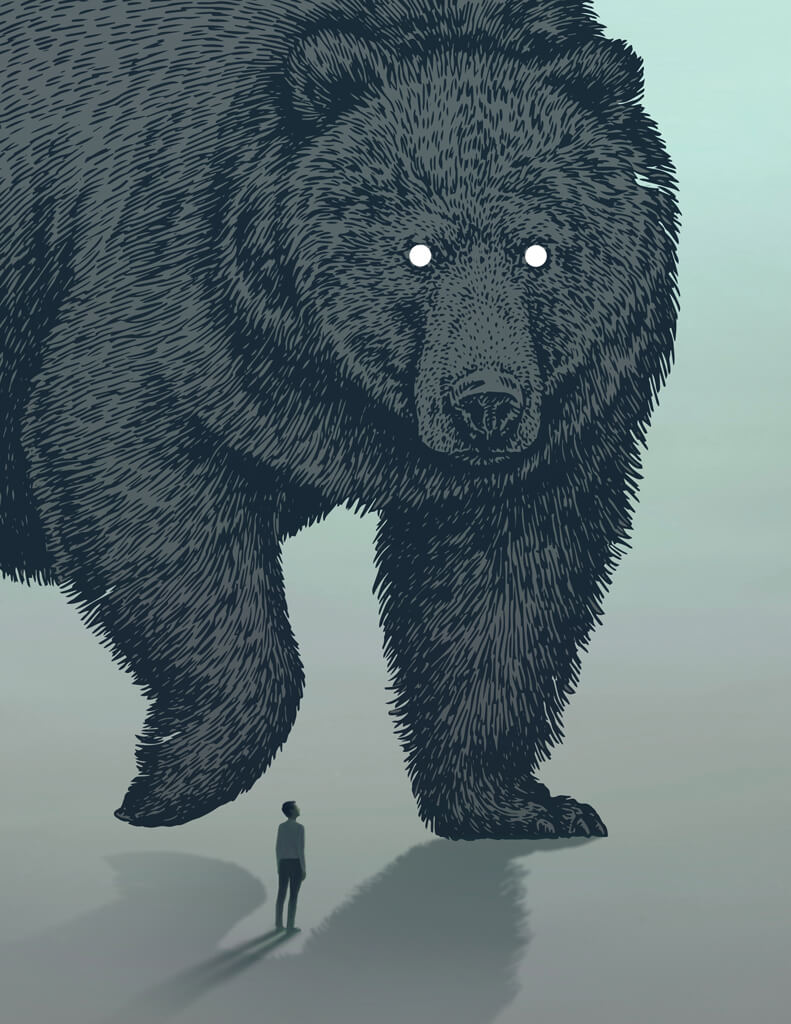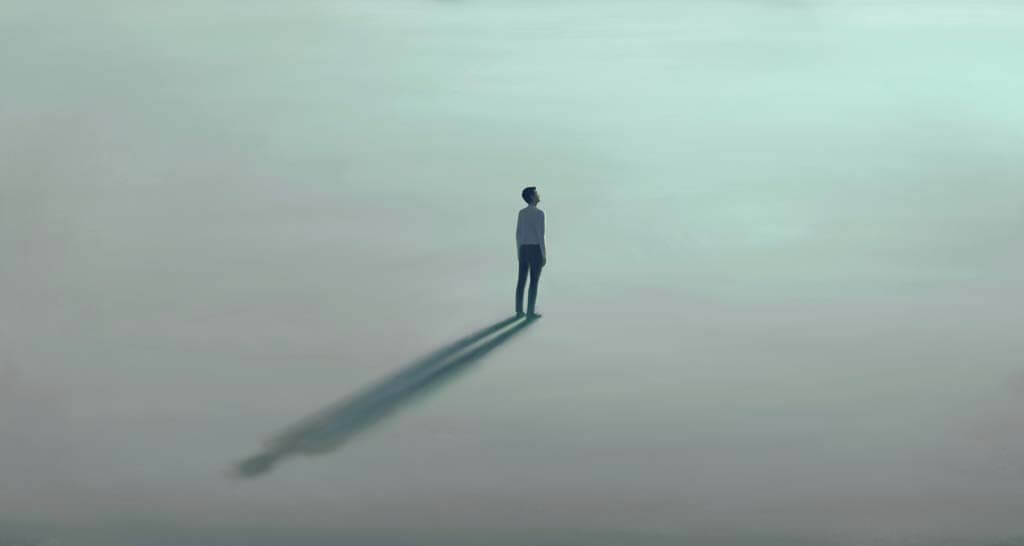BEAR WITH ME
by Mark Singer

Even though a virus is blind, we have learned, yet again, that like so many oppressive things, it disproportionately finds its way to those who are already suffering.
I feel privileged that, during the coronavirus pandemic, I was able to escape the confines of traumatized New York City and spend the autumn of the fateful year of 2020 living and working remotely as a psychiatrist in Vermont.
One September day, I was hiking up Magic Mountain. The wide grassy trail was bounded by tall trees whose leaves were raging with color. It was as if I was alone on the mountain. I felt small in a good way. Having climbed about an hour up, in the quietude of the moment, I decided to return a patient’s call. We had just started to talk when, shockingly, our conversation was crashed by a huge black bear barreling out of the woods ahead. I was about forty yards away on open grass.
Three things came to mind about bears: they can climb trees, they can run fast (about thirty miles per hour), and you’re not supposed to run when you see one. I don’t how the math works out as to how long it takes to cover forty yards at thirty miles per hour, but it’s not a long time. Images of burly dudes wrestling bears into submission in the wilds of Yellowstone came to mind. But being a New York City Jew, the prospect of staring down an enormous frickin’ bear seemed out of the question. I wasn’t channeling strongmen out west. More like Upper West Side. I felt like the bear even knew I was Jewish. I joke now, but I wasn’t laughing then. When it seemed as if the bear wasn’t looking, I started to run. Like my life depended on it.
Peering over my shoulder, I saw that the bear was mercifully running in the opposite direction. I had a long way to go, but I kept running until I arrived at the base of the mountain, where I told a local guy I had just run away from a bear. He smiled knowingly and then pointed out what, in my fear, I had failed to realize. “You weren’t running away from the bear,” he said. “The bear was running away from you.”
A couple of months later, I returned to the city, while the pandemic continued to ravage much of the country and the world. As hoped-for treatments for COVID-19 continued to prove themselves weak compared to the virus, the desperate need for a vaccine grew. And then, rather miraculously, it arrived. But who among us would be the fortunate ones eligible to get the vaccine soon after it became available? The answer to that question would in large part be driven by race and the historical repetition of social inequity. Inequity that, like a virus itself, insidiously grabs hold of society’s least fortunate souls and replicates.
Being a psychiatrist made me eligible to receive the vaccine in the early stages of its distribution. While the rollout was replete with inequities, many would rationalize, as I did, that although it was not a perfect system, we shouldn’t make perfect the enemy of good. And forgoing my opportunity to get the vaccine didn’t necessarily mean that another person more in need would get my spot. There were even reports that some batches of the vaccine were being wasted, having not been used in a timely manner by those deemed eligible. And it was good, after all, to get as many people vaccinated as quickly as possible. I could live with that. Although, we could say the same thing about education—the sooner more people get educated, the better. But it’s a lot better to be on the side of getting one than having to wait for the benefits to maybe never trickle down. Like all viruses, treatments for inequity remain elusive, and prevention seems to offer the only hope. Systemic racism is a virus and its not-yet-discovered vaccine should first be given to the most fortunate. But if offered, would we take it? Or would we be too afraid of what it might do to us?
With all of that in mind, I ambivalently opted to get the COVID-19 vaccine early on, when it was, I suppose, my turn. The vaccine site was in Harlem. Walking there on the day I was to get my first dose, I came upon an empty Morningside Park and I proceeded alone down its long, steep stairs. Some months before, those stairs were the scene of a grisly murder of an eighteen-year-old white woman who was a promising Barnard freshman. My daughter too was an eighteen-year-old college freshman at that time, which made thinking about that tragedy unbearable. Three Black teenagers were charged in the crime. Sadness and fear gripped me as I further descended those godforsaken stairs, and I started to run—like my life depended on it.
Approaching the vaccine site, I came upon a long line of people that stretched for several blocks. Before taking my place in line, I checked to make sure it was the correct line. It wasn’t. That line was to get tested for the coronavirus. It was a long time to wait to get tested, but more importantly, for those people, it would be a much longer wait to one day get the vaccine. The person waiting at the front of the line to get tested was an elderly Black man. He likely had been standing on that line for hours. Wearing his mask, he waited patiently for his turn. I was escorted to an adjacent line for those getting the vaccine. That line only had one person on it. I was second in a line behind a young white woman. She too could have been my daughter. My original rationale for getting the vaccine when I was eligible, despite being less in need than so many others, involved the notion of only cutting a figurative line. Standing there at the vaccine site forced me to confront a more literal one. Like so many rationalizations for my actions that are knowingly complicit with one form of systemic racism or another, they are harder to justify when the face of inequity is standing just a breath away.
That man deserves to get the vaccine before I do was my thought as I looked at him with pity. But, easy for me to say from my safe and lofty perch atop the wrongful system of inequity. A system that allowed me to adjudicate the order of things in the first place and where switching places now was no longer an option. And from that position of power, it would later cross my white privileged mind that even if well intended, I may have been guilty of seeing the forbearing and rule-abiding elderly Black man through a patronizing lens, a view that, by extension, can—worse yet even if unwittingly—include the racism reinforcing and dreadfully degrading notion of that man being a “good Black.” The defense attorney for Derek Chauvin, in emphasizing George Floyd’s illicit drug use, seemed to be implicitly suggesting that Floyd was a “bad one.” We should be loath to consider all such distinctions. They are dehumanizing. And they don’t matter. All Black lives do.
The comedian Dave Chappelle, speaking seriously, has another way of getting at that point. He implores white people to perform random acts of kindness for Black people. But he specifies that the white person must do this act of kindness only if the white person feels that the Black person doesn’t deserve it. Because as Chappelle notes, those people, too, surely didn’t get what they deserve.
Walking home along Frederick Douglass Boulevard, I encountered a Black man arguing with the police. He appeared to be homeless, was agitated, and seemed to be markedly intoxicated. Fearing his behavior, I hurriedly ran south toward my home on the Upper East Side, passing by him as he began to quickly stumble north into Harlem. And just as our paths crossed, he defiantly said, “I’m not the real criminal around here.”
It was his way of reminding me that I wasn’t running away from the bear—the bear was running away from me. We have a long way to go to get to systemic justice. We should run toward that like our lives depend on it. ■

-
Mark Singer, MD, is a psychiatrist on the faculty at New York Medical College, where he teaches medical students and psychiatric residents. He also teaches at the Manhattan Institute for Psychoanalysis and the National Psychological Association for Psychoanalysis, where the focus of his teaching has been on the dyadic and triadic treatment relationships between therapists, psychiatrists, and patients in the context of shared clinical work. His essays on themes of nostalgic experience, affective memory, and the passage of time have been published and presented widely. He is in practice in New York City.
-
Email: marksingermd@gmail.com
ROOM is entirely dependent upon reader support. Please consider helping ROOM today with a tax-deductible donation. Any amount is deeply appreciated. |





